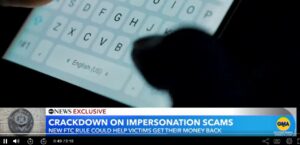
Scammers, beware: the Federal Trade Commission announced new rules on April 1 that toughen enforcement of laws designed to stop scammers who pose as banks (or other businesses) or governmental agencies.
The problem is big and getter bigger: Reported losses to these impersonation scams topped $1.1 billion last year, more than three times what consumers reported in 2020. The five most commonly reported ways that government and business impersonators persuade consumers to fork over money or simply give away their bank account or credit card numbers:
- Fake account security alerts
- Phony subscription renewals
- Fake Giveaways/discounts
- Fake Money to claim
- Bogus problems with the law
- Made-up package delivery issues
The methods that scammers use have shifted the last few years. While phone calls were the most prevalent way they would communicate with consumers, they are using text and email more and more.
The new rules give the FTC more powerful tools to fight and deter scammers who impersonate government agencies and businesses. It empowers the government agency to file federal court cases seeking to get money back to burned consumers and assess civil penalties against rule violators.
Consumer Rights Attorney Larry Smith, who has helped “scammed” consumers recover their stolen money for decades, is pleased with the new FTC rules but with this caveat:
“We’re glad that the federal government is cracking down on these banks, but for the most part, consumers are still going to need help from private attorneys to recover their money.” he says.
One more warning from Attorney Smith: “If you’ve been hit by one of these scams, don’t wait. Get legal help right away. There are time limits under these laws and if you wait too long you may lose out on important rights.”

